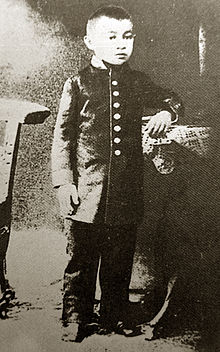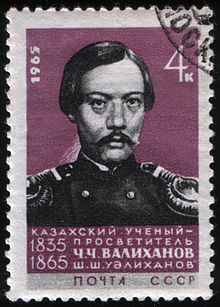- Chokan Valikhanov
-
Chokan Chingisovich Valikhanov 
A portrait of Chokan Valikhanov in his military uniformBorn November , 1835
Kushmurun fort in Kostanay ProvinceDied April 10, 1865 (aged 29)
Village of Sultan Tezek in Almaty ProvinceNationality Kazakh Other names Shokan Walikhanuli, Kazakh: Шоқан Шыңғысұлы Уәлиханұлы, Shoqan Shynghysuly Walikhanuly; Russian: Чокан Чингисович Валиханов, given name Muxammed Qanafiya Kazakh: Мұхаммед Қанафия Occupation Scholar, Historian, Ethnographer and Folklorist, Officer in Asiatic Department of Ministry of Foreign Affairs Known for First Russian-educated Kazakh historian, ethnographer, and civil servant Chokan Chingisovich Valikhanov (Kazakh: Шоқан Шыңғысұлы Уәлиханұлы, Shoqan Shynghysuly Walikhanuly; Russian: Чокан Чингисович Валиханов), given name Muxammed Qanafiya (Kazakh: Мұхаммед Қанафия)[nb 1] (November 1835 — April 10, 1865) was a famous Kazakh scholar, ethnographer and historian. He is regarded as the father of modern Kazakh historiography and ethnography. The Kazakh Academy of Sciences is named after him. His name is written Chokan Valikhanov in English based on the transliteration of the Russian spelling of his name, which he used himself. The Kazakh language variant of his name was written in the Arabic script, and was similar to the Russian version.[nb 2]
Contents
Childhood
He was born in November 1835 in the newly developed Aman-Karagaiskii district within the Kushmurun fort in what is nowadays the Kostanay Province of the Republic of Kazakhstan. Chokan was a fourth generation descendant of the Ablai Khan, a khan of the Middle jüz. Chokan's family was very respected by the government of the Russian Empire, and Valikhanov's father was awarded, during his life, six appointments as senior Sultan of Kushmurun okrug, a term as chief Kazakh advisor to the frontier board, a promotion to Colonel, and a separate term as senior Sultan in the Kokshetau okrug.[1]
Chokan spent his youth in his father’s traditional yurt. His father Chingis arranged his son’s early education, enrolling him in 1842 at age six in a small private school, or maktab, which provided a secular education. It was here that he began his studies of Arabic script and his native language Chagatai, which served as the lingua franca of Central Asia at that time.
At an early age Chokan moved from his father’s home to the estate of his paternal grandmother Aiganym, in Syrymbet. Chokan was enrolled in the Siberian Cadet Corps by his grandmother.
Valikhanov entered the military academy in Omsk in 1847. After graduating from the Omsk Cadet School, where he read not only Russian but also English language literature, Valikhanov traveled extensively in Central Asia in the late 1850s.[2] It was during his stay in Omsk that Valikhanov first made the acquaintance of Fyodor Dostoevsky.
Adult life
His work combined military intelligence and geographic exploration. His first successful expedition was his 1855-56 mission to the region of Issyq Köl. He was afterwards called to the capital in St. Petersburg in 1857 to report, and there he was elected to the Russian Geographical Society.
On June 28, 1858, Valikhanov began the expedition that would lead him to instant fame throughout Europe and into the pages of history. Serving as a decoy to the geo-political intentions of the mission, Valikhanov embarked with a caravan of 43 men, 101 camels and 65 horses. Following his successful passage through the Chinese border without suspicion, the caravan arrived in Kashgar in early October of 1858. Over the course of a half-year, Valikhanov took meticulous notes regarding major towns, including maps, the goods in the bazaars, the languages spoken and the customs practiced.[3]The expedition ended following increased suspicions, and they left Kashgar in April 1859. Valikhanov returned to St. Petersburg and became a fixture of the intellectual and cultural life during his short stay (1860 - spring of 1861) in the capital. The young Valikhanov was a staunch proponent of Westernization and critical of the influence of Islam in his homeland. In the words of the ethnographer Yadrintsev, for Valikhanov European civilization represented "the new Quran of life."[2]
In the spring of 1861 he became seriously ill with tuberculosis and had to leave St. Petersburg. He returned to his native steppe region in hopes of restoring his health. He never returned to St. Petersburg. However, frequent relapses in his health prevented advances in his career. In letters to his friend Dostoevsky, Valikhanov mentioned several unsuccessful plans to return to St. Petersburg. Valikhanov also mentioned campaigning for a political position in the West-Siberian Governor Generalship, centered in Tobolsk, like his father. In 1862, he successfully ran for senior Sultan, but Governor-General Alexander Duhamel ru:Дюгамель, Александр Осипович refused to confirm his position due to Valikhanov's health.
Valikhanov collected materials on Kazakh judicial practices in 1863. This was part of a government-backed project given by Duhamel, and led to the 1864 Memorandum on Judicial Reform. In 1864, Chokan was assigned to help with Colonel Cherniaev's continued conquest of Central Asia. Cherniaev’s forces marched west from the fortress of Vernoe (modern-day Almaty). Chernaiev advanced towards the Khanate of Kokand, planning to attack the fort at Aulie-Ata (modern-day Taraz). Chokan unsuccessfully pushed for a negotiated result without violence. Cherniaev won an easy victory and returned to Vernoe. Chokan left Chernaiev after the events at Aulie-Ata and, after stopping Vernoe, moved to the village of Sultan Tezek on the Ili River north of Vernoe. Colonel Chernaiev, however, was not unhappy with Valikhanov's work, and recommended him for a promotion.
Chokan spent his last remaining months in the village of Sultan Tezek, eventually marrying Sultan Tezek’s sister, Aisary. During this time, letters of correspondence to General Kolpakovskii, military governor of Smipalatinsk oblast, dated between November 1864 through February 1865, addressed Muslim revolts and rebel activity in nearby Qulja. Kolpakovskii held such esteem for Chokan that he offered Chokan a position in his administration once his health was restored.
Unfortunately, Valikhanov succumbed to his illness on April 10, 1865 at the age of 29. He was buried in the nearby cemetery of Kochen-Togan in present-day Almaty Province. N.I. Veselovskii, who in 1904 edited a collection of Valikhanov’s works, said that the short life of Valikhanov was a “meteor flashing across the field of oriental studies."[4]
Valikhanov and Dostoevsky
While still in Omsk, Dostoevsky had met Chokan Valikhanov. In Dostoevsky's opinion, Valikhanov was a brilliant, intrepid person, a scholar and ethnographer, and a talented folklorist. In their correspondence, the two intellectuals admitted their great mutual love and admiration.
You write me that you love me. I will tell you without ceremony that I have fallen in love with you. Never, to anybody, not even to my own brother, have I felt such attraction as I do to you, and God knows how this has come about. One could say much in explanation, but why should I praise you! And you will believe in my sincerity even without proof, my dear Vali-khan, and even if one were to write ten books on this theme, one would write nothing: feeling and attraction are inexplicable—Fyodor Dostoevsky, I4 December I856, SemipalatisnkWhen Dostoevsky served in Semipalatisnk, he met Valikhanov once again. The two men were also closely acquainted with renowned geographer Peter Semenov Tian-Shansky and Baron A. E. Wrangel, who came to Semipalatinsk from Petersburg in 1854 to serve as the new district prosecutor.
Dostoyevsky wrote from Semipalatinsk on I4 December I856 one of his most enthusiastic letters ever, addressed to his friend Valikhanov:
There is a statue of Valikhanov and Dostoevsky in the city of Semey, Kazakhstan, near the local Dostoevsky museum.
Major Work
Valikhanov produced many articles and books devoted to the history and culture of Central Asia. A short list:
- 'Chinese Turkestan and Dzungaria' Valikhanov and other Russian travellers, The Russians in Central Asia, London, Edward Stanford, 1865.
- Traces of Shamanism among the Kazakhs
- Regarding the camps of Kazakh nomads
- The Kazakhs
Valikhanov also compiled epic poetry, including "Kozy-Korpesh and "Bayan-Sulu", as well as what he called the Iliad of the Steppe, the Epic of Manas.
Valikhanov's report of his trip to Kashgar in 1858-59 remains a valuable account on the situation in Xinjiang in the aftermath of Wali Khan's invasion of the region and on the eve of the Muslim Rebellion of the 1860s.
Notes
- ^ Shokan was his pen-name, and later became his official name.
- ^ The name Shokan Shinghisuly Walikhanuli reflects modern independent Kazakhstan's intent to push Kazakh naming conventions further back into history.
References
- ^ In the Footsteps of Chokan, Smithsonian Institution
- ^ a b Futrell, Michael. Dostoyevsky and Islam (And Chokan Valikhanov). 'The Slavonic and East European Review'. Vol. 57, No. 1 (Jan., 1979), p. 20
- ^ [1]
- ^ Taken from "The Meteor Flash", at the Smithsonian Institution site
- ^ Futrell, Michael. Dostoyevsky and Islam (And Chokan Valikhanov). 'The Slavonic and East European Review'. Vol. 57, No. 1 (Jan., 1979), p. 21
Works by Valikhanov available in English
- "General view of Dzungaria" and "Travels in Dzungaria", by Captain Valikhanof: in Michell, John; Valikhanov, Chokan Chingisovich; Venyukov, Mikhail Ivanovich (1865), The Russians in Central Asia: their occupation of the Kirghiz steppe and the line of the Syr-Daria : their political relations with Khiva, Bokhara, and Kokan : also descriptions of Chinese Turkestan and Dzungaria; by Capt. Valikhanof, M. Veniukof and [others. Translated by John Michell, Robert Michell], E. Stanford, http://books.google.com/books?id=r7YoAAAAYAAJ
External links
- Information on Chokan from the Smithsonian
- Artwork of Chokan Valikhanov
- www.neweurasia.net (biography) (in English)
- www.peoples.ru Shokan Valikhanov (in Russian)
- Shokan Valikhanov in Omsk (in Russian)
- (Russian) (in Alexander M. Kobrinsky's library): Shokan Valikhanov (photos, biography)
- (Russian) Biography from the UNESCO branch in Kazakhstan
Categories:- History of Kazakhstan
- Turkologists
- Ethnographers
- Kazakhstani academics
- 1835 births
- 1865 deaths
- Kazakhstani orientalists
Wikimedia Foundation. 2010.



